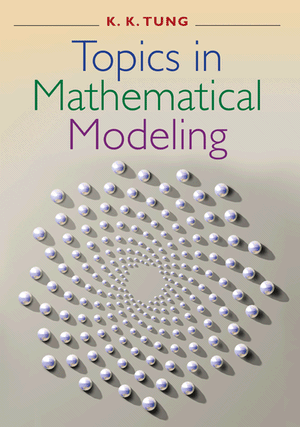
Mathematical Modeling
I developed an upper-level mathematical modeling course for Bard College which I taught in the fall of 2016. This page contains information about this course.Summary
The course focused on modeling with ordinary differential equations and difference equations, and we explored applications to growth of organisms and allometric laws, population dynamics, HIV modeling, and climate modeling. The only prerequisite was Bard's Linear Algebra and Ordinary Differential Equations course, and most of the students in the class were sophomore, junior, or seniors majoring in mathematics, science, or economics.The textbook for the course was Topics in Mathematical Modeling by K. K. Tung
Homework Assignments
Here are the weekly homework assignments for the course, which were worth 40% of the course grade. These assignments are a mixture of problem-solving and computer analysis in Excel, SageMath, or Mathematica. Students were encouraged to work together on the homework but were required to write up their own solutions individually.- Homework 1 (Modeling with Difference Equations)
- Homework 2 (More Difference Equations, Geometric Models)
- Homework 3 (Allometric Models, Modeling with ODE's)
- Homework 4 (Modeling Blood Circulation, Euler's Method)
- Homework 5 (More Euler's Method, Heun's Method)
- Homework 6 (HIV Modeling)
- Homework 7 (Reaction Equations, Mixing Problems, Systems of ODE's)
- Homework 8 (Climate Models, Modeling with PDE's)
- Homework 9 (More on Systems of ODE's)
- Homework 10 (Lotka–Volterra, Morse Potential Model)
Takehome Exams
There were two takehome exams for the course, both of which were worth 25% of the grade.Syllabus
Here was the syllabus for the course. Textbook Information
Textbook Information
The textbook is Topics in Mathematical Modeling by K. K. Tung. You will need a copy of the textbook for reading and homework problems, though you do not need to bring it to class. The textbook is available online via JSTOR:
The above link only works from on campus. From off campus, you will need to use the following link and sign in with your bard acount:
I'm not completely sure that the textbook will be available online for the entire semester, so if you have your own computer I recommend downloading all of the PDF's.
If you want a paper copy, there are currently new copies selling on Amazon.com starting at $41, and used copies starting at $30.
Course Policies
Course Description
What is a mathematical model? And how can it be used to help solve real world problems? This course will provide students with a solid foundation in modeling and simulation, advancing understanding of how to apply mathematical concepts and theory. Though we will discuss many different kinds of mathematical models, the focus of this course will be on modeling with ordinary differential equations.Prerequisites
The only prerequisite is Math 213 (Linear Algebra with ODE's), though some prior experience with computer programming would be helpful.Homework
There will be a weekly homework assignment, usually due on Fridays. Homework will involve constructing and analyzing mathematical models, often with the aid of Mathematica. All homework assignments should be written in either LaTeX or Mathematica and submitted to me by e-mail.Final Project
There will be a final project on a topic of your choice. I am happy to allow group projects, though each member of a group must contribute as much effort as a student working individually. A typical project for a pair of students consists of a 10 15 minute class presentation discussing either an original mathematical model or a model that you found in a published paper or book, together with a writeup covering the model in more detail. More information on the final project will be given in the second half of the semester.Exams and Grading
The grade will be based on the homework, the final project, a takehome midterm, and a takehome final exam:| Homework | 40% |
| Takehome Midterm | 25% |
| Takehome Final | 25% |
| Final Project | 10% |
Project Information
Part of the requirements for this class include a final project. Here is some basic information about the project:- • Though individual projects are allowed, I would prefer for you to work together in groups of two or three.
- • The project must involve a short in-class computer presentation, of the following length:
- • Individual Project: 4–5 minute presentation
- • Two-Person Project: 8–10 minute presentation
- • Three-Person Project: 12–15 minute presentation
- • All projects must include a short paper describing a specific mathematical model or class of models, followed by either a mathematical analysis or computer simulation of your model. The paper should be 4-5 pages per person, including a description of any results obtained from computer experiments.
Project Topics
Your choice of topic may involve constructing your own mathematical model of a given situation, describing a well-known model from science or economics, or describing a class of models including at least one specific example. Here are some ideas to get you started:- • The Consortium for Mathematics and its Applications (COMAP) runs an annual Mathematical Contest in Modeling (MCM) for undergraduate math majors. One option for your project would be to choose one of the MCM questions from previous years and develop a model for the situation described in the problem. The COMAP website keeps a list of all the old problems stretching back to 1999, so you can browse through the questions and find one that interests you.
- • You could learn about and describe a known mathematical model, such as one of the models in the textbook that we didn't cover, or any other mathematical model that you can find in another textbook or journal article. Possibilities include models of Zipf's law, network scaling and models of the internet and social networks, discrete-time logistic population models and the onset of chaos, further HIV models, differential equation models in epidemiology, models of traffic flow, vibration models, models of animal locomotion, neural models, models of oscillating chemical reactions, etc.
- • A discussion of some large class of models or aspect of modelling that we did not discuss in depth, such as Markov chain models, Monte Carlo simulations, network models, game theory models, decision tree models, optimization of models, polynomial fitting, Runge-Kutta methods for solving differential equations, and so forth. Any such topic must include discussion of at least one specific model.